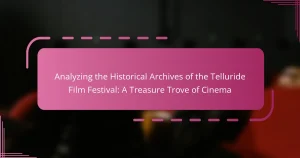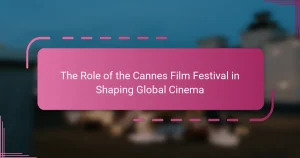The Melbourne International Film Festival (MIFF) is an annual event established in 1952, making it one of the oldest film festivals globally. This festival showcases a wide array of films, including international and Australian cinema, documentaries, short films, and feature films. MIFF serves as a vital platform for both emerging and established filmmakers, offering various events such as panel discussions and workshops. It attracts thousands of attendees each year and plays a crucial role in promoting Australian film culture and the industry. The significance of MIFF in Australian film history is highlighted through its contributions to the local and international film landscape.

What is the Melbourne International Film Festival?
The Melbourne International Film Festival (MIFF) is an annual film festival held in Melbourne, Australia. Established in 1952, it is one of the oldest film festivals in the world. MIFF showcases a diverse range of films, including international and Australian cinema. The festival typically features documentaries, short films, and feature films. It serves as a platform for emerging filmmakers and established directors alike. MIFF also hosts various events, including panel discussions and workshops. The festival attracts thousands of attendees each year. It plays a significant role in promoting Australian film culture and industry.
How did the Melbourne International Film Festival begin?
The Melbourne International Film Festival began in 1952. It was established to showcase international cinema and provide a platform for Australian filmmakers. The festival aimed to promote cultural exchange through film. Over the years, it grew in size and reputation. The inaugural event featured a selection of films from various countries. It attracted a diverse audience and industry professionals. The festival has since become one of the longest-running film festivals in the world. It plays a crucial role in the Australian film industry today.
What were the initial goals of the festival?
The initial goals of the Melbourne International Film Festival were to promote Australian cinema and showcase international films. The festival aimed to create a platform for local filmmakers. It sought to encourage the appreciation of diverse cinematic art forms. The festival was established in 1952, making it one of the oldest film festivals in the world. It provided a venue for independent filmmakers to present their work. The festival also aimed to foster a community of film enthusiasts and professionals. By showcasing international films, it aimed to broaden the audience’s understanding of global cinema. Overall, the festival focused on cultural exchange and the celebration of film as an art form.
Who were the key figures involved in its establishment?
The key figures involved in the establishment of the Melbourne International Film Festival (MIFF) include John D. McDonald and a group of film enthusiasts. John D. McDonald is recognized as a founding director of MIFF. He played a crucial role in organizing the first festival in 1952. The festival was initiated to promote international cinema in Australia. Early supporters included filmmakers and critics who valued diverse film presentations. MIFF has since grown into one of the longest-running film festivals in the world. Its establishment marked a significant moment in Australian film history. The festival has contributed to the development of the local film industry and cultural landscape.
What role does the Melbourne International Film Festival play in Australian cinema?
The Melbourne International Film Festival (MIFF) plays a crucial role in Australian cinema by showcasing local and international films. It provides a platform for Australian filmmakers to present their work to a wider audience. MIFF also promotes cultural exchange by featuring international films alongside Australian productions. The festival has been instrumental in launching the careers of many Australian filmmakers. Established in 1952, it is one of the oldest film festivals in the world. MIFF attracts thousands of attendees each year, enhancing the visibility of Australian cinema. It also offers industry programs that support film development and networking. Through these initiatives, MIFF significantly contributes to the growth and recognition of Australian cinema on a global scale.
How does the festival support local filmmakers?
The festival supports local filmmakers by providing a platform for their work to be showcased. It offers opportunities for networking with industry professionals. Local filmmakers gain access to workshops and masterclasses led by experienced filmmakers. The festival also includes awards specifically for Australian films, promoting local talent. Additionally, it features a dedicated section for local short films. This focus on local content encourages community engagement and support. The festival’s history includes numerous premieres of significant Australian films, enhancing visibility for local filmmakers. Overall, this support is crucial for the growth of the Australian film industry.
What impact does it have on the Australian film industry?
The Melbourne International Film Festival (MIFF) significantly impacts the Australian film industry. MIFF provides a platform for local filmmakers to showcase their work. This exposure can lead to increased funding opportunities and distribution deals. The festival also fosters networking among industry professionals. It highlights Australian cinema on an international stage. In 2021, MIFF screened over 200 films, showcasing diverse Australian stories. The festival encourages audience engagement with local films. It contributes to the cultural identity and economic growth of the Australian film sector.
Why is the Melbourne International Film Festival significant in Australian film history?
The Melbourne International Film Festival (MIFF) is significant in Australian film history as it showcases local and international cinema. Established in 1952, MIFF has become one of the longest-running film festivals in the world. It provides a platform for Australian filmmakers to present their work. The festival has premiered numerous influential Australian films, contributing to the country’s cinematic identity. MIFF also supports emerging talent through various awards and programs. Its role in promoting cultural dialogue through film is vital. The festival attracts a diverse audience, fostering appreciation for the art of cinema in Australia.
What milestones has the festival achieved over the years?
The Melbourne International Film Festival has achieved significant milestones since its inception in 1952. It began as a small event showcasing local films. Over the years, it grew to become one of the largest film festivals in the Southern Hemisphere. In 1986, the festival introduced its first international competition. This attracted filmmakers from around the world. In 2000, the festival launched the MIFF Premiere Fund to support Australian filmmakers. By 2010, it had screened over 3,000 films from more than 100 countries. The festival also became a key platform for emerging talent in the Australian film industry. In 2020, it adapted to a virtual format due to the pandemic, reaching a wider audience online.
How has the festival evolved in response to changes in the film industry?
The Melbourne International Film Festival has evolved significantly in response to changes in the film industry. Initially focused on showcasing local Australian films, the festival has expanded its scope to include international cinema. This shift reflects the globalization of the film industry, where diverse storytelling is increasingly valued.
In the 1990s, the festival began incorporating digital technologies, adapting to the rise of independent filmmaking. This inclusion allowed for a broader range of films and innovative formats. The festival also embraced streaming platforms as they emerged, providing new avenues for film distribution.
Furthermore, the festival has prioritized inclusivity and representation in its programming. This change aligns with industry-wide movements advocating for diverse voices and stories. The introduction of various awards categories has also been a response to the evolving landscape, recognizing excellence in different filmmaking aspects.
Overall, the Melbourne International Film Festival has continuously adapted to reflect and influence the changing dynamics of the global film industry.
How does the Melbourne International Film Festival connect with international cinema?
The Melbourne International Film Festival connects with international cinema by showcasing diverse films from around the world. It features works from various countries, highlighting global storytelling. The festival serves as a platform for international filmmakers to present their projects. It also fosters cultural exchange through discussions and panels. The event attracts international audiences and industry professionals. In 2023, over 300 films from more than 50 countries were screened. This diversity enriches the local film community and promotes global cinema appreciation. The festival’s international focus enhances its reputation as a key player in the global film landscape.
What international films have been showcased at the festival?
The Melbourne International Film Festival has showcased numerous international films. Notable examples include “Parasite,” which won the Academy Award for Best Picture in 2020. Another significant film is “The Square,” which received the Palme d’Or at the Cannes Film Festival in 2017. “Amour,” a French film that won the Best Foreign Language Film Oscar, was also featured. The festival has a history of presenting award-winning films from various countries. These selections highlight the festival’s commitment to global cinema and its impact on Australian film culture.
How does the festival foster global collaborations?
The Melbourne International Film Festival fosters global collaborations by providing a platform for international filmmakers. It showcases diverse films from various countries, promoting cross-cultural dialogue. The festival invites industry professionals from around the world, facilitating networking opportunities. Collaborative projects often emerge from these interactions. Additionally, it partners with global film organizations to enhance outreach. The festival’s international awards attract global talent, further encouraging collaboration. Events like workshops and panels focus on shared experiences in filmmaking. This approach builds lasting relationships between Australian and international filmmakers.
What are the key features of the Melbourne International Film Festival?
The Melbourne International Film Festival (MIFF) is known for its diverse film selection and cultural significance. MIFF showcases a wide range of films, including independent, international, and Australian cinema. The festival typically features over 400 films across various genres. It also provides a platform for emerging filmmakers through short film programs and competitions. MIFF hosts numerous events, including Q&A sessions with filmmakers and industry panels. The festival often includes special screenings and retrospectives of significant works. MIFF has a strong focus on promoting local talent and fostering the Australian film industry. Established in 1952, it is one of the longest-running film festivals in the world.
What types of films are typically featured at the festival?
The Melbourne International Film Festival typically features a diverse range of films. These include independent films, documentaries, and international cinema. The festival showcases Australian films prominently as well. It also highlights works from emerging filmmakers. Established filmmakers often present their latest projects at the festival. Additionally, the event includes genre films, such as horror and animation. Special screenings and retrospective films are also part of the lineup. This variety reflects the festival’s commitment to celebrating cinematic art in all its forms.
How are films selected for screening?
Films are selected for screening based on a combination of artistic merit, thematic relevance, and audience appeal. Selection committees review submissions and consider factors such as storytelling, direction, and cinematography. They also assess how well the film aligns with the festival’s mission and goals. Additionally, films that highlight cultural diversity or innovative techniques may receive preference. The Melbourne International Film Festival, for example, emphasizes showcasing Australian talent and international perspectives. This approach supports the festival’s role in promoting local filmmakers. The selection process often involves multiple rounds of evaluation by industry professionals.
How can audiences engage with the Melbourne International Film Festival?
Audiences can engage with the Melbourne International Film Festival by attending screenings and events. The festival features a diverse selection of films from various genres and countries. Viewers can purchase tickets online or at the venue. Additionally, audiences can participate in Q&A sessions with filmmakers and actors. The festival often hosts workshops and panel discussions for deeper insights. Social media platforms enable audiences to follow updates and share experiences. Engaging with festival content online enhances the overall experience. Lastly, joining mailing lists provides information on upcoming events and exclusive offers.
What are the best ways for attendees to participate in the festival?
Attendees can participate in the Melbourne International Film Festival by purchasing tickets for screenings. This allows them to watch a diverse range of films. Engaging in Q&A sessions with filmmakers enhances the experience. Attendees can also attend workshops to learn about filmmaking techniques. Volunteering at the festival provides hands-on involvement. Networking events allow attendees to connect with industry professionals. Social media engagement helps share experiences with a broader audience. Lastly, participating in discussions and panels fosters a deeper understanding of film topics.
What resources are available for those interested in learning more about the festival?
The Melbourne International Film Festival offers various resources for learning more about its significance. The official website provides comprehensive information about the festival’s history, programming, and events. Educational programs and workshops are available for those interested in film studies. Additionally, the festival publishes an annual report detailing its impact on Australian cinema. Online archives contain past festival programs and award winners. Social media platforms feature updates and community engagement opportunities. Local libraries may also have books and articles on the festival’s influence in Australian film history.
What are some tips for maximizing the experience at the Melbourne International Film Festival?
To maximize the experience at the Melbourne International Film Festival, plan your schedule in advance. Review the festival program early to select films of interest. Purchase tickets ahead of time to avoid sell-outs. Attend screenings with Q&A sessions to gain insights from filmmakers. Participate in workshops or panels for deeper engagement with film topics. Explore the festival’s social events to network with other film enthusiasts. Utilize the festival app for real-time updates and information. Lastly, consider attending multiple sessions for a fuller experience of the festival’s offerings.
The Melbourne International Film Festival (MIFF) is a significant entity in Australian film history, established in 1952 as one of the oldest film festivals globally. It showcases a diverse array of films, including local and international cinema, and serves as a platform for emerging and established filmmakers. The festival promotes cultural exchange, supports local talent through various programs and awards, and has played a pivotal role in enhancing the visibility and growth of the Australian film industry. MIFF’s evolution reflects changes in the film industry, and it fosters global collaborations while engaging audiences through screenings, discussions, and workshops.


